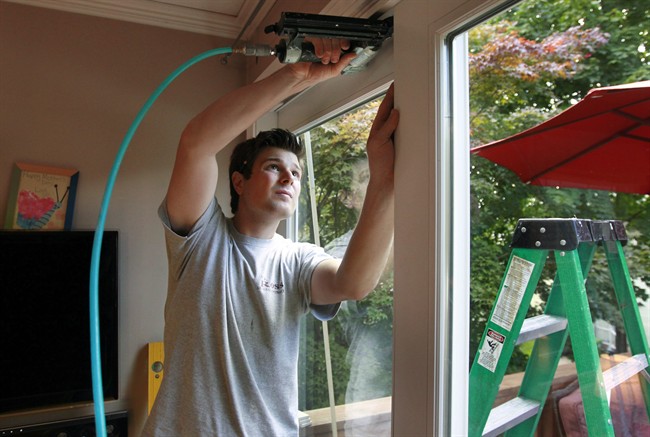Canadian homeowners are planning to spend more than $17,000 on renovations this year, according to a new poll.

While that amount is down from nearly $20,000 in 2014, a poll released by CIBC on Friday shows that the number of homeowners planning a reno remains high, at 42 per cent.
Not only are Canadians reno budgets shrinking, what they spend their money on is shifting as well.
The poll found that fewer people are planning “big ticket” renovations that will run them at least $25,000 (16 per cent in 2015 vs 18 per cent last year).
READ MORE: Canadians want to renovate, but cost is a big worry
The majority of projects will centre around basic home maintenance (64 per cent), like new paint, floors and appliances. Next on the list of projects was outdoor landscaping (32 per cent), followed by upgrading bathrooms (29 per cent) and kitchens (28 per cent).
The harsh winter will also eat up a portion of Canadians reno budgets, with 13 per cent of respondents saying they were planning home repairs to fix weather-related damage.
The trend, CIBC pointed out, is that Canadians are turning their attention away from dream kitchens and big-ticket renos, and focusing on practical, lower-cost projects.
“While Canadians continue to invest in renovations, they are taking a very practical approach in 2015 focused on lower-cost projects,” said Barry Gollom, vice president of Mortgages and Lending at CIBC.
Gollom said it’s important to stay on top of home maintenance in order to both safeguard your investment and save money down the road when what was a small problem becomes a big one.

Get weekly money news
“Homeowners should budget for general upkeep. Putting money into fixing a leaky roof today is far cheaper than the cost of a new roof or dealing with expensive water damage in the future.”
READ MORE: Planning a home renovation? Tips for keeping your finances in order
Canadians in large numbers are choosing to stay in their current homes and fix it up, rather than relocate to a move-in-ready house.
“I find that more and more people right across Canada are looking for creative solutions to add more space so that they don’t have to move,” said Scott McGillivray, HGTV host and author of How To Add Value To Your Home.
McGillivray cautioned, however, that before starting any renovation, homeowners need to look closely at their situation, since some renos will be a better investment than others.
“You don’t want to build a $150,000 custom kitchen in a $200,000 home. You have to be realistic about your needs, and where money is best spent,” he said.
McGillivray said kitchens and income suites have consistently proven to have the highest return over the couple years.
READ MORE: Reno advice – the best bang for your buck, easy fixes and what to avoid
A recent survey from TD Bank showed that more than half of Canadians polled (56 per cent) would consider buying a fixer-upper or renovating their current home rather than buying a house that’s move-in-ready.
Given the state of some housing markets in Canada, the decision to stay put isn’t entirely surprising.
Sky-high home prices in Toronto and Vancouver are encouraging many to pursue renos instead of looking for new homes.
“They can’t afford to buy new, so what they’re doing is they’re improving the living spaces that they’re in now,” said Jon-Carlos Tsilfidis, the renovators council chair at the Building Industry and Land Development Association.
The CIBC telephone poll of 1,020 Canadians conducted by Nielsen Consumer Insights is considered reliable within 3.1 percentage points, 19 times out of 20.
With a file from The Canadian Press








Comments